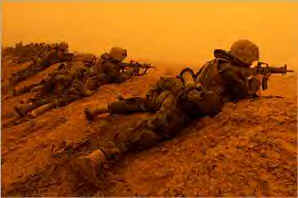

Incoming
By Tim Lickness
Tet 1968
The Communists Offensive during Tet in 1968 was fully engaged when I arrived for my tour of duty, during the Vietnam War. We could hear incoming mortar rounds exploding and our artillery answering back, even as we left the airplanes that had brought us from the U.S. There was little time to acclimate and most of us were assigned quickly to our units. I was assigned to the elite 101st Airborne Division "Screaming Eagles", of World War II fame. I was immediately given orders to lead a platoon of infantry paratroopers, whose assignment was to clear the North Vietnamese Army (NVA) from the jungle, to the west of the ancient capital city of Hue. Two weeks after arriving I turned 21. Most of those in my platoon were younger than I was. We were in combat within days and found ourselves depending on each other to survive. My platoon sergeant made it clear that anyone using drugs would not need to worry about being killed by the enemy, he would do it himself. Firefights were furious, fierce and frightening. We discovered we were up against a well-trained, disciplined and determined enemy. Unlike us, they would continue to fight until they were casualties or the war was over. Strangely you appreciated what the individual soldier on the other end of your rifle was going through. We understood the terror in the eyes of those we captured. We were moved by the personal tragedy upon seeing the picture of a wife or girlfriend, in the wallet retrieved from the body of an enemy soldier. You thought of your own wallet and what they might think if they looked through it. The counter-offensive launched by the U.S. and South Vietnamese Army left little time for contemplation or rest. The use of helicopters, to transport the infantry, saw to it that we went quickly from one battle to another. Nothing prepares you for the lighting quick touch down in a hot (under fire from the enemy) landing zone (LZ). The convulsion of a rocket hitting near you leaves you momentarily stunned. It will be several more minutes before you realize why the front of your fatigues is wet. Some things, you discover, are instinctive. You yell for a medic to help, while you frantically blow air into the mouth of a comrade, lying near you, unconscious and not breathing. Your mind races trying to remember what to do. What's the right cadence? Where do I push? How Long? Where's the medic? Finally you stop. It's a death kiss and you know it. Few will ever know that you tried and failed. Fewer still will ever know what it was like to have to pause and spit out his last meal, before you can take another breath. Another explosion and the time to reflect, on the insanity of it all, is gone. You just roll over and rejoin the fight. We win more battles than we lose. We are well trained. We are superbly armed. Our air cover is the best in the history of warfare. By the summer of 1968 we had chased the NVA to the border. We grieved for our losses and we were tired. But we knew we were successful. You could travel from the east coast of northern South Vietnam through the A Shau Valley and look into Laos and seldom see the enemy. It wasn't until we returned home and read about 1968 that we learned that we lost, and that the Tet Offensive was the turning point in the first war that the United States had not won. Looking back now, on the thirtieth anniversary of these events, I don't know how we, the individual soldier, could have done more or done better. To this day I am not sorry I was there. I learned a lot about courage, leadership, fortitude and about myself. There are those who tell us that war was wrong. They tell us that those of us who fought that war were dupes, wackos, murders or, sometimes charitably, victims. I don't believe that. We were citizen soldiers, fighting a hard war and fighting it honorably. I'm proud of what we did and I'm proud of what we stood for.
Copyright Tim Lickness 1998
Previous Story Back to Calendar Next Story